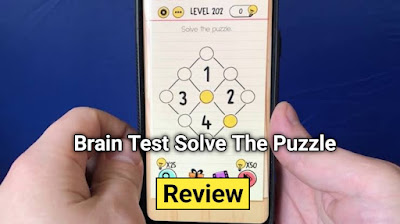brain test solve the puzzle
Puzzle-solving is a great way to keep your brain active and sharp. It can help improve your problem-solving skills, memory, and concentration. In this blog post, we will explore different types of brain tests and puzzles that you can try to solve.
One type of brain test is the IQ test. IQ tests measure intelligence and are often used to assess a person's cognitive abilities.
They typically consist of a series of questions and tasks that test verbal and nonverbal intelligence. Some examples of IQ test questions include:
Verbal reasoning: These questions test your ability to understand and analyze written information.
Numerical reasoning: These questions test your ability to understand and analyze numerical information.
Spatial reasoning: These questions test your ability to visualize and manipulate shapes and patterns.
Another type of brain test is the memory test. Memory tests measure your ability to remember and recall information.
They can test short-term memory, long-term memory, or both. Some examples of memory test questions include:
Word recall: You are given a list of words to remember, and then asked to recall as many as possible.
Digit recall: You are given a string of numbers to remember, and then asked to recall them in the correct order.
Picture recall: You are shown a picture and then asked to recall as many details as possible.
Puzzle-solving is another great way to test and improve your brain function. Puzzles can help improve your problem-solving skills, creativity, and critical thinking. Some popular types of puzzles include:
Crossword puzzles: These puzzles consist of a grid of squares with clues to fill in the correct words.
Sudoku puzzles: These puzzles consist of a grid of squares with numbers.
The goal is to fill in the squares with the correct numbers without repeating any in a row, column, or region.
Jigsaw puzzles: These puzzles consist of a picture that has been cut into small pieces. The goal is to put the pieces back together to form the original picture.
To solve any of these puzzles it is important to have a systematic and structured approach. For example, in the case of crossword puzzles, one could start with the easiest clues and fill them in first, or you can start with filling the clues which have the most number of letters.
This approach can help you to tackle the difficult clues with more ease. For Sudoku puzzles, one could start with filling the squares that have the least number of possible answers. And for Jigsaw puzzles, you could start with the edges and then move to the center.
In addition to solving puzzles, there are other things you can do to improve your brain function. Here are a few tips:
Exercise regularly: Exercise has been shown to improve brain function and protect against cognitive decline.
Get enough sleep: Sleep is essential for brain function and memory consolidation.
Eat a healthy diet: A diet rich in fruits, vegetables, and omega-3 fatty acids has been shown to improve brain function and protect against cognitive decline.
Challenge yourself: Keep your brain active and challenged by trying new things, learning new skills, and setting new goals.
In conclusion, brain tests and puzzles are a great way to keep your brain active and sharp. IQ tests, memory tests, and puzzle-solving can help improve your problem-solving skills, memory, and concentration.
By trying new brain tests and puzzles regularly and keeping an overall healthy lifestyle, you can help protect your brain and improve your cognitive abilities.









0 Comments